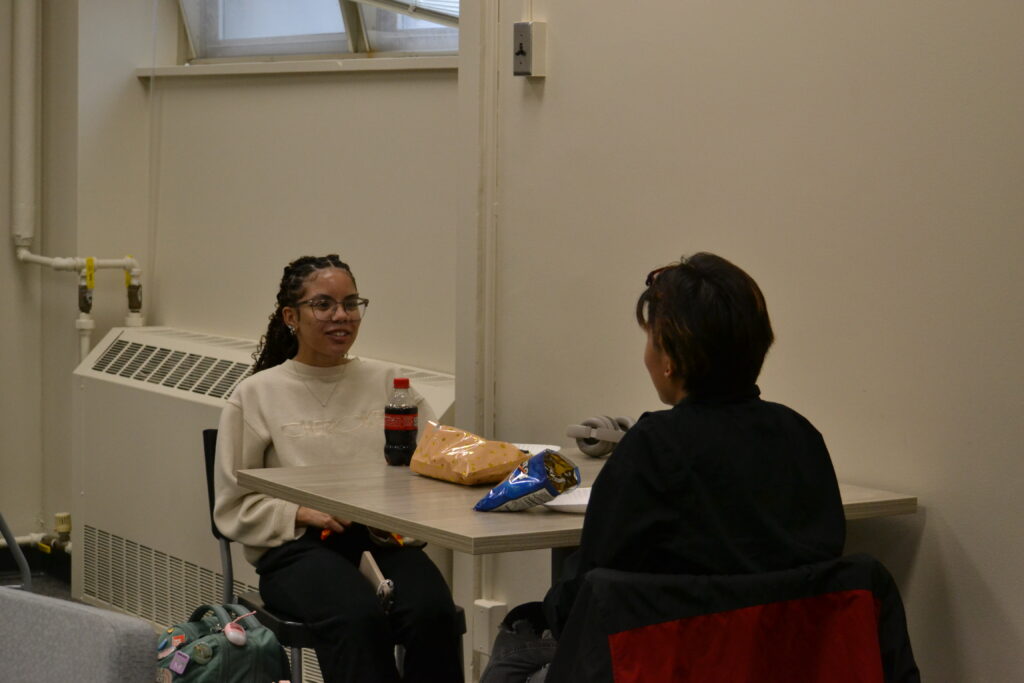Peer connection plays critical role for first-gen students at UMN
Meaningful peer relationships shape the experiences of first-generation students navigating university life.

It’s not unusual for incoming college students to be daunted by the social adjustment to college life, but first-generation students at the University of Minnesota Twin Cities said their experiences are uniquely challenging.
“I remember, when I first got to the university, there were so many people who I wanted to make friends with. But as I got to know them more, it just became apparent that we didn’t see the world in the same way,” Angie Hurtado Rivera, a second-year, first-generation student at the university, said.
Peers are an essential lifeline in college, particularly for students who struggle to connect with the dominant identities of their campus. A recent survey conducted by AccessU found that the main contributing factor to first-generation respondents’ sense of belonging on campus was their ability to meaningfully connect with peers.
Follow-up interviews with survey respondents revealed that many first-gen students feel it is easier to establish meaningful connections with fellow first-gen students. However, they struggle to relate to their non-first-gen peers, mainly because of differences in socio-economic and cultural backgrounds. For some, living in a “mainstream” campus culture — among students who have been socialized into college by higher-earning, college-educated parents — leaves them feeling as if they don’t quite belong.
“My biggest challenge probably would be overcoming my imposter syndrome,” said Nyanak Gatpan, a fourth-year first-generation student at the university. “Just feeling like a lot of time in spaces as if I don’t belong because, you know, I’m a first-generation student. I feel like I didn’t come from the right family with just unlimited access to resources and finances.”
Claire Pitrof, a first-gen student studying microbiology, agreed. “Part of being a first-gen student is you have this latent imposter syndrome where you’re like, ‘Am I really supposed to be here? Like, do I really belong in this space?’”
Intersecting identities, such as race, ethnicity or LGBTQ+ status, can add to this perceived disconnect. Ashlee Ramirez, a first-generation student who is part of the Latino student organization Mi Gente, said she felt alone coming to the university, which is a predominately white institution.
“Especially coming from Milwaukee, which is a more diverse city, my high school was mostly 60% African American and 30% white and the rest was every other minority,” Ramirez said.
To cope, first-gen students said they find each other.
“There’s a quicker bond that I make with people who are first-gen,” Trinity Sitzman, a second-year first-gen and LGBTQ+ student, said. “It feels a lot like my other identities in a weird way. It’s the same thing with other queer people. I’m like, ‘All right, we understand.’”
Peers are essential for first-gen students
Tai Mendenhall, a psychology professor at the university who has an interest in peer relationships, said peer connection is essential because humans are social creatures.
“There’s a fair amount of research that shows starting in teenage years, peers become even more important than family relationships,” Mendenhall said. “It’s not until about the late 20s, early 30s when we start to return toward family and a smaller group of peers, but whoever they are, humans always need other humans.”
A lack of peer connection in college often leads to social isolation, which Mendenhall said is the main contributor to depression.
Mendenhall said peer connections are especially important for first-gen students, many of whom come from low-income families who cannot always offer ample guidance to navigate the university. Peer relationships often step in to offer such guidance.
Intimate relationships with common interests also provide critical support to first-gen students who may not have as much money as other students in the classroom, which can feel isolating.
For first-gen students, having someone willing to do an inexpensive activity on a Friday night or getting help emailing a professor is crucial to their sense of belonging, Mendenhall said. Peers validate the financial, academic and social realities of first-generation students.
Without peers, he said, first-gen students often experience imposter syndrome — a feeling of doubt and fear about their abilities to fit in or make friends. This can arise from a mismatch in first-gen student relationships, he said.
“Are you making friends in class, and they all want to go out on a Friday night, and they’re going to meet somewhere in Dinkytown because that’s where they live in the apartments? But you’re living at home because your family can’t afford to put you in an apartment, and that’s a difference,” Mendenhall said. “Now you don’t feel like you have as strong of a social connection.”
Ramirez said she has experienced all of this. She works an on-campus work-study job and has to budget when to spend money, meaning she sometimes has to sacrifice dinner nights with friends.
“Whatever I get from my paycheck is all I have,” Ramirez said. “My friends could be like, ‘Let’s go out to eat,’ but I can’t really go out to eat as often, because then I don’t have money for groceries or have money to pay for my music subscription or something else.”
Intersectionality plays a big role in connecting with other first-generation students, to the point where certain activities, such as attending a college football game, could be associated with one identity but not with another. According to the University of Minnesota’s First Gen Snapshot, 63% of first-generation students are also students of color.
Ramirez said she felt imposter syndrome while attending Gopher football games with her non-Latino friends. While she said she enjoys going to games and tailgating, it is hard to find people who look like her at football games.
“I just didn’t feel like I belonged,” Ramirez said. “I was like ‘Should I be the one cheering for the team? This feels fake.’”
Ramirez discovered her community by being involved in Mi Gente, where she is currently its marketing director.
“I’m a very shy person. However, being in Mi Gente helped me be exposed to all the communities,” Ramirez said. “I met people with similar backgrounds as me as well as people with different backgrounds, but we all related to being a minority at the university.”
Student peer groups need a jump start
The University of Minnesota has a variety of programs in place to support first-generation students’ sense of belonging on campus. The President’s Emerging Scholars Program, TRIO and First Gen Week programming all offer targeted academic and social support to first-generation students.
Gatpan, a senior majoring in health and wellbeing sciences, said she belongs to several of these groups, as do other first-generation students.
“I know almost everyone there because if you’re a PES student, you’re also a TRIO student, so I just see familiar faces,” Gatpan said, adding that everyone can share the experience of coming to a predominantly white institution as children of parents who didn’t attend college, many of them as people of color.
Yet no student group is currently dedicated to undergraduate first-generation students. LeeAnn Melin, associate vice provost for student success in the Office of Undergraduate Education, said a student group did exist prior to the COVID-19 pandemic, but it ended when its student leaders graduated.
First-gen students said they want to see the return of a first-gen student group. Elliot Breazile, a first-gen freshman majoring in psychology, said they are working to fill that gap.
This semester, Breazile became the vice president of the Multiracial Student Union, which serves many first-generation students because of the overlap between the communities.
“As a first-gen student, that’s kind of messed up that there are no groups for us to represent us,” Breazile said. “I feel like we are very important, at least for me. It’s something that I need support for.”
Breazile said the club wants to serve anyone who falls under an international, immigrant, multiracial or first-gen identity.
Official university support this fall
This semester, the university announced the creation of a First-Gen Student Center, set to open in fall 2024.
The gathering space in Appleby Hall will offer first-gen specific programming and advising.The center and its three full-time staff members will aim to support first-gen students in whatever way possible, said Melin, who is one of the lead administrators.
“Ultimately, the goal of this center is to help students be successful here at the U, to retain them and to graduate them and doing so by creating a sense of belonging and by providing the support that they need when they need it,” Melin said.
Melin said she hopes the center will also serve as a lounge space for first-generation students to socialize at any time.
“A space for students to hang out is our goal, where they can gather, they can put food in a refrigerator, they can just be there,” Melin said.
While the specific services provided at the center are yet to be defined, one of its key functions will be to help first-gen students, specifically those new to campus, find peer support groups to connect with, whether that is through the center itself or in other areas on campus.
“The beginning of the academic year is such an important time. And so I think that’s what we’re trying to figure out,” Melin said. “We hope that we’re able to be a starting spot for students to be able to find their community on campus. Always being there if they need it, but then also finding that in other spots on campus.”
This story was reported and written for AccessU: First Gen on Campus by Amirah Razman, John Henry Sullivan, Gabrielle Erenstein and Elijah Awada

